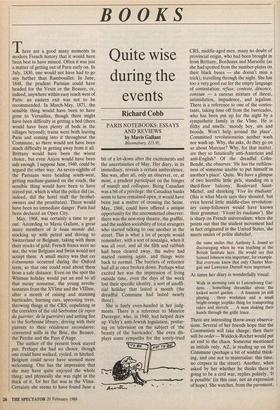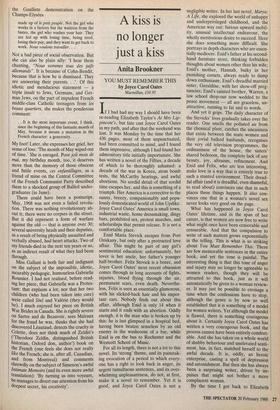BOOKS
Quite wise during the events
Richard Cobb
PARIS NOTEBOOKS: ESSAYS AND REVIEWS by Mavis Gallant There are a good many moments in modern French history that it would have been best to have missed. Often it was just a matter of getting out of Paris early on. In July, 1830, one would not have had to go any further than Rambouillet. In June, 1848, the prudent Parisian could have headed for the Vexin or the Beauce, or, indeed, anywhere within easy reach west of Paris: an eastern exit was not to be recommended. In March-May, 1871, the sensible thing would have been to have gone to Versailles, though there might have been difficulty in getting a bed (there would have been plenty of beds in the villages beyond); trains were both leaving Paris and coming into it throughout the Commune, so there would not have been much difficulty in getting away from it all. Brittany would have been the wisest choice, but even Anjou would have been safe enough. I suppose June, 1940, could be argued the other way. As seven-eighths of the Parisians were heading south-west, getting machine-gunned on the roads, the sensible thing would have been to have stayed put, which is what the police did (as, indeed, did the hotel staff the brothel- owners and the prostitutes). There would have been no immediate danger. Paris had been declared an Open City.
May, 1968, was certainly a time to get out. According to Mavis Gallant, a great many members of le beau monde did, stocking up with petrol and driving to Switzerland or Belgium, taking with them their stocks of gold; French francs were no use, the wise Belgians and Swiss would not accept them. A small mercy was that ces evenements occurred during the Oxford term, so that one could read about them from a safe distance. Even on the spot the Whitsun holiday would put an end to all that messy nonsense, the young revolu- tionaries from the XVIme and the VIIIme, after a month of raising and manning barricades, burning cars, uprooting trees, throwing things at the CRS, copulating in the corridors of the old Sorbonne (le repos du guerrier, de la guerriere) and setting fire to the Sorbonne library, driving with their parents to their residences secondaires: converted mills in the Brie, the Beauce, the Perche and the Pays d'Auge.
The author of the present book stayed put. Perhaps she had no choice, though one could have walked, cycled, or hitched. Belgium could never have seemed more welcoming. One has the impression that she may have quite enjoyed the whole thing; and physically she was right in the thick of it, for her flat was in the VIme. Certainly she seems to have found June a
Bloomsbury, £15.95,
bit of a let-down after the excitements and the uncertainties of May. Her diary, in its immediacy, reveals a certain ambivalence. She was, after all, only an observer, or, at most, a prudent participant on the fringes of manifs and colloques. Being Canadian was a bit of a privilege: the Canadian banks seem to have remained open, it would have been just a matter of crossing the Seine. May, 1968, could have offered a unique opportunity for the uncommitted observer: there was the non-stop theatre, the graffiti, and the sudden sociability of total strangers who started talking to one another in the street. This is what a lot of people would remember, with a sort of nostalgia, when it was all over, and all the filth and rubbish had been cleared away, the metro had started running again, and things were back to normal. The barriers of reticence had all at once broken down. Perhaps what excited her was the impression of living outside time, even the days of the week lost their specific identity, a sort of unoffi- cial holiday that lasted a month (the dreadful Commune had lasted nearly three).
She is fairly even-handed in her judg- ments. There is a reference to Maurice Duverger, who, in 1940, had helped draw up Vichy's anti-Jewish legislation, postur- ing on television on the subject of 'the beauty of the barricades'. She even dis- plays some sympathy for the sorely-tried CRS, middle-aged men, many no doubt of provincial origin, who had been brought in from Brittany, Bordeaux and Marseille (as she had spotted from the number-plates on their black buses — she doesn't miss a trick), travelling through the night. She has too a very good ear for the empty language of contestation: refuse, conteste, &nonce, constate — a curious mixture of threat, intimidation, impudence, and legalism. There is a reference to one of the contes- tants, taking time off from the barricades, who has been put up for the night by a sympathetic family in the VIme. He is filthy and smells: 'moody boy, sits and broods. Won't help around the place'. Committed revolutionaries neither wash nor wash up. Why, she asks, do they go on so about Marcuse? Why, for that matter, are they so fanatically anti-American and anti-English? Of the dreadful Cohn- Bendit, she observes: 'He has the ruthless- ness of someone unable to put himself in another's place'. Quite. We have a glimpse of two horrible little girls, standing on a third-floor balcony, Boulevard Saint- Michel, and shrieking Wive les etudiants' (this is what Mavis says they shouted, but even horrid little middle-class revolution- ary camp-followers would have known their grammar: Tivent les etudiants'). She is sharp on French universalism: when she points out that the student movement had in fact originated in the United States, she meets smiles of polite disbelief,
the same smiles that Anthony S. found so discouraging when he was teaching at the British Institute here. He would say that Samuel Johnson was important, for example. But everyone knew that only Charles Mor- gan and Lawrence Durrell were important.
At times her diary is wonderfully visual:
Walk in morning rain to Luxembourg Gar- dens. . . Something dreamlike about the locked secret garden. . . A fountain jet still playing. . . three workmen and a small bright-orange jeeplike thing for transporting rakes and shovels. . . A man shaking their hands through the grille fence.. .
There are interesting throw-away observa- tions. Several of her friends hope that the Communists will take charge; then there will be order — Waldeck-Rochet would put an end to the chaos. Someone mentioned as initials only, AZ, is reading up on the Commune (perhaps a bit of wishful think- ing, and one not to materialise: this time, no corpses in the street). Another, when asked by her whether he thinks there is going to be a civil war, replies politely, 'It is possible' (in this case, not an expression of hope). She watches, from the pavement, the Gaulliste demonstration on the Champs-Elysées
made up of le petit peuple. Not the girl who works in a factory but the waitress from the bistro, the girl who washes your hair. They are fed up with losing time, being tired, losing their pay, and they want to get back to work. Nous voulons travailler. . .
Not a bad piece of social observation. But she can also be plain silly: 'I hear them chanting, "Nous sommes sous des juifs allemands". It is because of Cohn-Bendit, because that is how he is dismissed. They are answering their parents. . Of this idiotic and mendacious statement — a triple insult to Jews, Germans, and Ger- man Jews, on the part of impudent French middle-class Catholic teenagers from les beaux quartiers, she makes the ponderous comment:
. . It is the most important event, I think, since the beginning of this fantastic month of May, because it means a mutation in the French character: a generosity. . . .
My foot! Later, she expresses her grief, her sense of loss: 'The month of May wiped out of time.' She is enraged. Poor jo/i moil de mai, my birthday month, too, it deserves more than the memory of those obscene and futile events, ces enfantillages, as a friend of mine on the Central Committee of the French Communist Party described them to a shocked group of Balliol under- graduates (in June). There could have been a postscript. May, 1968 was not even a failed revolu- tion. There was nothing revolutionary ab- out it; there were no corpses in the street. But it did represent a form of warfare against the old — that is anyone over 30; several university heads and their deputies, as a result of being physically assaulted and verbally abused, had heart attacks. Two of my friends•died in the next ten years or so, as an indirect result of what they had been through. Miss Gallant is both fair and indignant on the subject of the impossible, idiotic, incurably pedagogic, humourless Gabrielle Roussier. I had not realised, before read- mg her piece, that Gabrielle was a Protes- tant: that explains a lot; nor that her two children (who had been taken into care) were called Joel and Valerie (they would be). I much enjoyed her piece on British War Brides in Canada. She is rightly severe on Sartre and de Beauvoir, sees Malraux for the fraud he was, thinks that she had discovered Leautaud, detects the cruelty in Colette, does not think much of Zeldin's (`Theodore Zeldin, distinguished British historian, Oxford don, author') book on the French (one feels she does not really like the French; she is, after all, Canadian, and from Montreal) and comments shrewdly on the subject of Simenon's awful Intimate Memoirs (and its even more awful translation): 'By turning us into voyeurs, he manages to divert our attention from his deepest secret, his creativity'.



















































 Previous page
Previous page